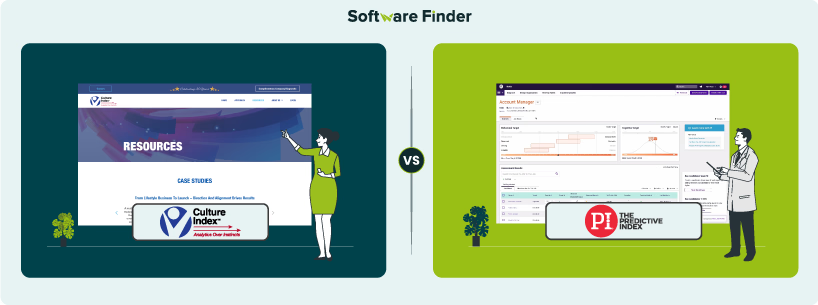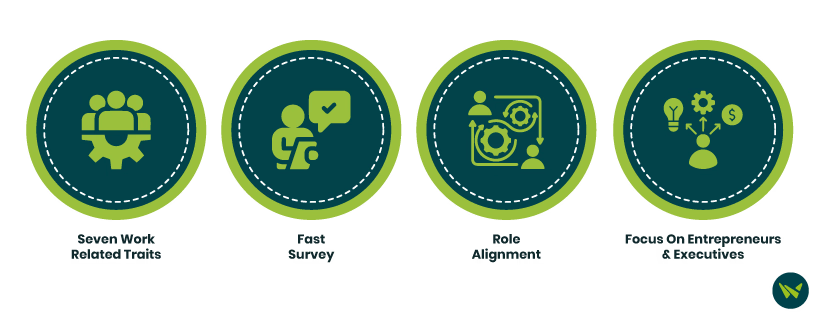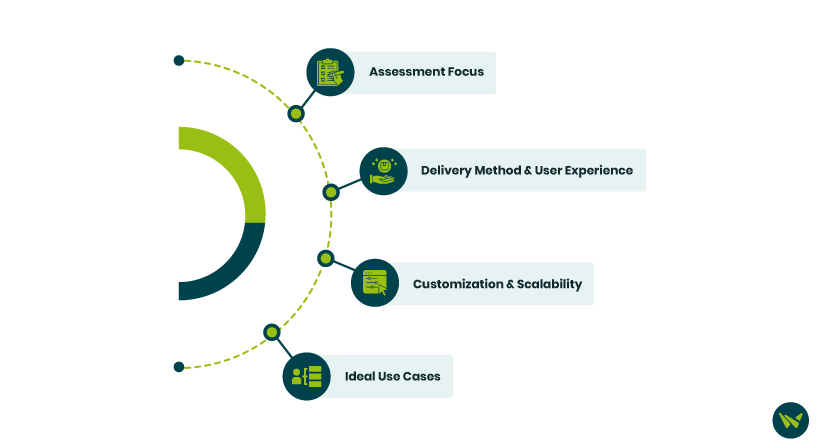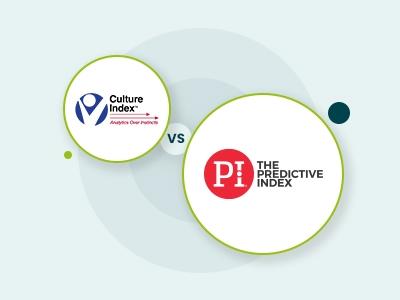
‘Great vision without great people is irrelevant.’
This insight from business author Jim Collins highlights a hard truth: no matter how strong your strategy is, it won’t succeed without the right people behind it. That’s why hiring—and retaining—the right talent is critical to a company’s success.
In an age where businesses rely on data-driven analytics, gut feelings in hiring and talent development are giving way to science-backed behavioral insights. Two of the most talked-about tools in this space are the Culture Index and the Predictive Index (PI).
Both promise to help organizations identify the right talent, reduce turnover, and improve team performance. But how do they stack up against each other?
This comprehensive Culture Index vs Predictive Index comparison breaks down what each system offers, how they work, and which one might be a better fit for your business.
Features | Culture Index | Predictive Index |
Assessment Focus | Behavioral traits only | Behavioral + cognitive abilities |
Target Users | Executive teams, strategic hiring | HR teams, managers, recruiters |
Implementation Style | Advisory-heavy, consultant-led | Software-first, scalable, self-service |
Customization | Highly customized to each business | Predefined profiles with some tailoring |
Team Dynamics Tools | Emphasis on leadership composition | Strong tools for team building and alignment |
Hiring Volume Suitability | Best for low-to-mid volume | Great for high-volume recruiting |
The Culture Index is a strategic advisory tool designed to help companies optimize their people strategy by identifying behavioral traits and aligning them with job roles. It focuses on helping business leaders understand how their employees and candidates are wired, how they think, solve problems, interact with others, and perform under pressure.
Standout Features

- Seven Work-Related Traits: The Culture Index measures autonomy, social ability, patience, conformity, energy units, logic, and ingenuity
- Fast Survey: Respondents complete a simple adjective checklist, which typically takes about 10 minutes
- Role Alignment: Businesses can create ideal profiles for specific roles and then compare individual assessments to those benchmarks
- Focus On Entrepreneurs And Executives: Culture Index often emphasizes its value for CEOs and executive teams looking to optimize leadership and organizational structure
Strengths
- One of its main selling points is hands-on consultation. Clients receive personalized guidance from Culture Index Advisors to interpret results and make strategic decisions
- Especially useful in building high-performing leadership teams and aligning C-suite behaviors with business strategy
The Predictive Index Behavioral Assessment is a scientifically validated, free-choice, self-report tool designed to understand the core behavioral drives that influence workplace performance. Created by The Predictive Index®, this assessment helps organizations gain insight into how individuals are naturally wired to think, work, and interact with others.
It measures four primary behavioral drives, including dominance, extraversion, patience, and formality. By identifying a person’s unique behavioral pattern based on these drives, this assessment provides a clear picture of how someone will perform in a role, collaborate within a team, and respond to leadership or change.
Standout Features

- Cognitive Assessment: A 12-minute test that evaluates a candidate’s ability to learn and adapt
- Software Integration: An advanced platform with talent optimization software that integrates with applicant tracking systems and human resources (HR) platforms
- Science-Backed: Backed by 65 years of scientific research and validation, ensuring reliable and accurate insights into workplace behavior
Strengths
- Beyond assessments, PI offers tools for team building, management strategy, and job design
- Provides targeted interview questions to improve the effectiveness of the hiring process
- Well-suited for high-volume hiring and team analysis

While both the Culture Index and PI aim to optimize workforce performance by analyzing behavioral data, they diverge significantly in terms of structure, purpose, and application. Understanding these distinctions can help organizations choose the right tool for their specific needs.
1. Assessment Focus
Culture Index evaluates seven core personality traits tied to workplace behavior but does not include cognitive testing. It’s designed to uncover an individual’s natural behavioral tendencies and assess how well they align with the requirements of a given role
PI, on the other hand, offers a dual assessment model that measures both behavioral drives and cognitive ability, gauging how quickly someone learns and adapts.
2. Delivery Method And User Experience
Culture Index operates through a consultant-led model, offering personalized guidance, interpretation, and strategic support. The system is less reliant on software and more on human insight.
PI is a software-as-a-service (SaaS) platform with a user-friendly interface, enabling HR teams and managers to interpret data, run reports, and manage assessments independently.
3. Customization And Scalability
Culture Index offers highly tailored benchmarks for roles, often crafted through collaboration with a consultant. This deep customization works well for executive and leadership hiring but may not scale easily for large teams.
The Predictive Index enables users to define job targets and match candidates using standardized profiles, making it easier to deploy across departments or business units.
4. Ideal Use Cases
Culture Index shines in leadership team design, executive hiring, and strategic-level cultural alignment. On the other hand, PI is ideal for volume hiring, employee development, team dynamics, and organization-wide performance optimization.
Choose Culture Index if:
- You’re a founder, CEO, or senior executive looking to make strategic people decisions
- You want a deep, consultative approach with ongoing guidance
- Your hiring volume is moderate and focused on leadership or specialized roles
- You're looking to realign existing teams for better performance
Choose Predictive Index if:
- You’re scaling quickly and need a practical, software-driven tool
- You want data that’s easy to interpret across departments and roles
- Your HR team prefers managing assessments in-house
- You want to assess both behavior and learning capability
Overall, the question isn’t whether the Culture Index or Predictive Index is better; it’s which one fits your organization’s goals, structure, and leadership style. By clearly identifying how these assessment tools differ in philosophy and function, organizations can make a more confident, informed decision that supports their unique goals and workforce challenges.
